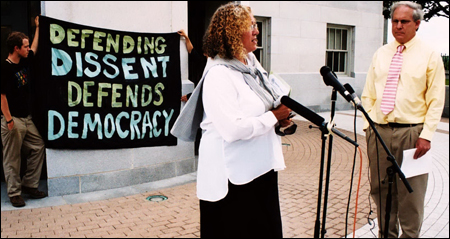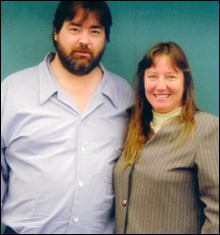
LAWYER ACTIVIST: Lynne Williams (center). |
If you were a reporter and you received a letter like the one excerpted below, what would you make of it? It’s from an inmate at the maximum-security, solitary-confinement Supermax unit at the Maine State Prison in Warren. The “Dino” referred to is prisoner Deane Brown, 42, a burglar, dedicated human-rights activist, and the major source of information for a series of articles I have written over the past year on abuse of mentally ill and other prisoners in the Supermax, the 1000-inmate prison’s 100-cell warehouse for the most violent men, but also a place for those whom prison officials see as troublemakers.A prison is by definition a totalitarian kind of place, where control is a way of life. Still . . .
“Dino was brought down here more than a week ago . . . and ever since then Mental Health has cleared him off this [suicide] watch at least three times that I know of. Every time he’s cleared either the Chief of Security or the Deputy Warden put him back on. While he’s on this watch he cannot have visits, phone calls, mail, or write letters out. He’s completely stripped out except for a security dress to cover himself. He’s not allowed his reading glasses or a book to pass the time. Officers won’t let him sleep more than 15 minutes at a time before they bang on his door to make sure he’s ok. Dino has stopped eating and taking his medication because of this treatment.
“Dino is not suicidal! This is the Prison’s way of restricting his access to the outside world and especially the media. Just last week all newspapers in the entire prison were confiscated, and no newspapers were allowed back into the prison for about five days. . . .
“[The Supermax officers] have perfected the art of what I call ‘No Touch Torture.’ Noise is the weapon of choice, and unless an inmate breaks down and gets placed on medication he’s not getting more than 30 minutes of sleep at a time.”
“If this is true, it is deeply disturbing,” says Shenna Bellows, the Maine Civil Liberties Union director. “Courts have found sleep deprivation to be an Eighth Amendment violation.” The Eighth Amendment to the US Constitution prohibits “cruel and unusual punishments.”
Officials shut the gate
A year after beginning my series on the Supermax — officially, it is the Special Management Unit or SMU — I am still writing about the same subject, the torture of prisoners, although now it is combined with the subject of the denial to the press of access to prisoners — and the refusal of officials to answer questions. (See sidebar, “Stonewalling is normal,” for more examples of official obstruction.)
The author of the above letter wrote me to explain why I haven’t been allowed contact with Deane Brown. His letter, dated November 6, was sent by way of another correspondent, since he assumed mail to me would be confiscated by prison authorities. The Phoenix is granting him anonymity to protect him from repercussions from them.
The authorities maintain that outgoing mail isn’t read unless it’s from a list of inmates who are suspected of criminal activity. Incoming mail isn’t read, they say, though it’s screened for contraband. But while Brown was on suicide watch, he did not receive mail I sent him, he says. Other letters I have sent prisoners asking for a reply have not had a response, so I assume some of my letters or theirs have been confiscated. The prison has not responded to my query asking if any of them were.
On November 13, around the time I received the above letter, Brown was shipped out to a maximum-security prison in Maryland. Maine Department of Corrections commissioner Martin Magnusson says, vaguely, Brown was a threat to prison security. Brown believes his transfer was in retribution for his activism. (See “Baldacci’s ‘Political Prisoner,’” November 24, by Lance Tapley.)
Put yourself again in the shoes of a reporter: should I discount what the above letter-writer says, on the reasonable-sounding assumption that criminals are not to be trusted?
In confirmation of his description of Deane Brown’s treatment, however, I have letters from two other current Supermax inmates. They paint the same scene of what many people would perceive as torture — especially, for a man officially deemed suicidal. They describe also the same intention by prison officials to deny Brown access to the press — namely, to me.
Isolation chamber

HAPPIER DAYS: Deane Brown with friend Bethany Berry. |
Providing many more details, Brown himself sent a letter from his Maryland cell to his best friend, Bethany Berry, of Rockland, giving a chronology of what happened to him. He reports these highlights of his recent treatment in the Maine Supermax:— “I was kept under constant watch with no clothing, bedding, soap, toothbrush, or toothpaste. Only a thin mat and security blanket.”